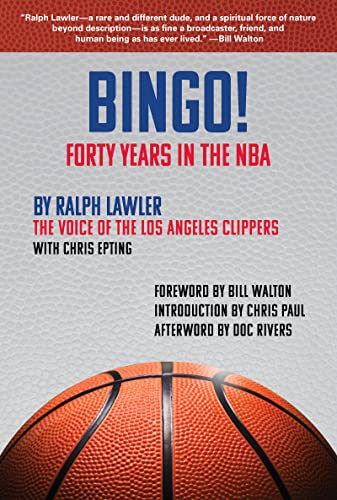Bingo!: Forty Years in the NBA

“For those who were fans of Ralph Lawler the broadcaster, and for those who had never heard of Ralph Lawler, Bingo! reveals an interesting man living an interesting life.”
In radio and television sports the local team broadcaster can acquire celebrity status and become part of the team brand. The radio and television play-by-play voice is often the major connection between a sports team and its fans. Such figures as Vince Scully in Los Angeles, Johnny Most in Boston, Red Barber in New York, and Ernie Harwell in Detroit became synonymous with the team and, in some cases, legendary figures in their communities.
Ralph Lawler, although not a national figure, was for several decades the voice of the Los Angeles Clippers of the NBA. His recent retirement evoked praise and love from Clipper fans and from many team members. In turn, Lawler reciprocates that love for the fans, the players and many others across the NBA. In 2019, Lawler was elected to the Naismith Memorial Basketball Hall of Fame.
In Bingo!: Forty Years in the NBA Lawler retraces his love affair with basketball that began in Peoria, Illinois as a young boy playing the game with friends, then in high school, and finally at Bradley University where an injury ended his playing days. That ultimately led him to his broadcasting career which began on campus radio at Bradley, as well as, in local commercial radio. His voice was honed and refined in speech classes, while taking an Introduction to Radio class, and by participating in campus theater.
After graduating from college, Lawler moved to Philadelphia where he worked in local media covering a wide range of sports, including the early days of professional basketball. At one point, Lawler worked at a station owned by Dick Clark and his father. The Clarks mentored Lawler and, subsequently, proved to be important contacts. From Philadelphia Lawler moved west to California.
Bingo! is not strictly chronological in its organization. There are any number of interruptions and diversions in the narrative. There are lists of favorite players and teams, most memorable celebrities, and non-basketball athletes, all with explanation of the choices. In his list of the Greatest Players of All-time, Lawler appropriately separates them by era, avoiding the pitfall of comparing apples and oranges.
Lawler comments on Drugs in the NBA, changes in working conditions for players, decries but understands “load management” and evaluates the NBA Players Association and its impact. He offers considerable praise and some criticism to Oscar Robertson, a HOF player and a force behind the success of the NBAPA. Most of these lists are set off from the text in boxes that interrupt the flow of the narrative over several pages. These are generally interesting, if not always substantive, although some might be dismissed as not rising above the level of gossip.
Among the more substantive of these evaluations include an analysis of the excellent and insightful contributions of Elgin Baylor to the NBA, as both player and general manager, and often overshadowed by Jerry West, whom Lawler greatly admires. Some may be surprised by Lawler’s criticism of the coaching legend Chuck Daley.
Major criticism is primarily directed at Donald Sterling, owner of the Clippers for 30 years. Sterling’s broken moral compass and his remarkable mismanagement kept the Clippers on the low end of the NBA standings. Ultimately, Sterling’s racism and immoral behavior led to the NBA banning him from ownership and forcing him to sell the team. It was an extraordinary moment in NBA history, a reversal of the fortunes of the Clippers. NBA Commissioner Adam Silver is highly praised for his handling of this entire affair.
Lawler’s admiration for Chris Paul and Doc Rivers is effusive. He produces excellent profiles of the two men and takes them beyond their basketball resumes. In both cases, the human qualities of honesty and character stand out.
One of the most interesting and fully developed profiles, which runs throughout the book, is that of Bill Walton. Those who remember Walton only as a player, or a broadcaster, or off-best character may be surprised by Lawler’s description of Walton, who was Lawler’s broadcasting partner for 15 years. Walton emerges as a complex personality and a human being of exceptional kindness and thoughtfulness. These qualities are not obvious to outsiders, but Lawler offers case after case to illustrate the complexity and beauty of this man.
For those who were fans of Ralph Lawler the broadcaster, and for those who had never heard of Ralph Lawler, Bingo! reveals an interesting man living an interesting life. For those who are fans of the NBA or who love basketball, Bingo! is well-worth the effort. And for those who are fascinated by the vicissitudes of life, there is more than enough to keep you engaged with Bingo! and Ralph Lawler. To use Lawler’s famous tag line, “Oh me, oh my.”